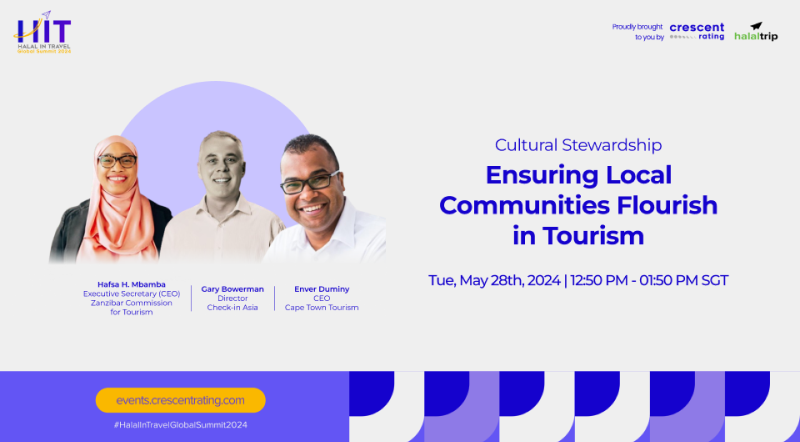
The "Halal In Travel Global Summit 2024," hosted by CrescentRating in Singapore from May 28th to May 30th, brought together key figures in the tourism industry to discuss the future of cultural stewardship. Among the prominent speakers were Hafsa H. Mbamba, Executive Secretary (CEO) of the Zanzibar Commission for Tourism, Gary Bowerman, Director of Check-in Asia, and Enver Duminy, CEO of Cape Town Tourism. Their session provided profound insights into how tourism can empower local communities while preserving cultural heritage.
Gary Bowerman, the moderator, kicked off the session by posing a fundamental question: What does cultural stewardship mean in the context of tourism? Hafsa H. Mbamba defined it as a sense of responsibility that both authorities and communities take to protect and manage the culture and heritage of a destination sustainably. She highlighted Zanzibar's rich cultural heritage and shared an example from Yamani, a village where the community created their own tour operating company. This initiative allowed the locals to control the narrative and promotion of their area, ensuring that tourism development aligned with their cultural values.
Enver Duminy added that cultural stewardship involves being the "designated driver" for culture and heritage, guiding tourists, communities, and governments in understanding and preserving these aspects. He shared the example of Bo-Kaap in Cape Town, an area originally inhabited by the Cape Malay community, known for its multicolored houses. The influx of tourists and rising property prices threatened the cultural fabric of Bo-Kaap. Cape Town Tourism worked with the community and local government to balance economic development with cultural preservation, ensuring that the area's unique heritage was not lost.
The panelists discussed how the COVID-19 pandemic had reshaped their strategies. Mbamba noted that Zanzibar had to rethink its tourism strategy, traditionally driven by charter flights and beach tourism. The government launched the "Green Zanzibar" campaign to promote cultural and heritage tourism. This campaign encouraged existing tourism businesses to adopt sustainable practices and aimed to attract visitors interested in Zanzibar's rich cultural offerings.
Duminy shared that Cape Town had already embraced responsible tourism principles long before the pandemic. The city’s focus was not on volume but on value and sustainability. The pandemic reinforced the need for this approach, highlighting the importance of balancing economic growth with cultural preservation. Cape Town Tourism emphasized community engagement and responsible tourism to ensure that both tourists and locals benefited from the industry.
The discussion also touched on the role of technology and social media in promoting cultural stewardship. Mbamba illustrated how social media can be a powerful tool for controlling the narrative of a destination. She cited an example of a local content creator who provided essential travel information about Zanzibar before Ramadan. This initiative educated potential visitors about Zanzibar's predominantly Muslim culture and promoted responsible travel behavior.
Duminy acknowledged the double-edged nature of social media, where the focus on selfies often overshadows the appreciation of cultural sites. However, he emphasized the importance of working with communities and influencers to promote respectful storytelling and cultural awareness. Cape Town Tourism has explored initiatives like digital detox campaigns to encourage visitors to immerse themselves in local cultures without the distraction of their devices.
Seasonality is a significant challenge for many destinations. Mbamba explained that Zanzibar's tourism is heavily influenced by the European calendar, with peaks during summer and Christmas. However, efforts to diversify their market by targeting visitors from Asia and the Gulf region have helped spread tourist arrivals more evenly throughout the year. Despite these efforts, managing peak seasons remains a challenge, requiring careful planning and community engagement to ensure sustainable tourism growth.
Both panelists emphasized the importance of collaboration in achieving sustainable tourism. Duminy highlighted Cape Town's partnerships with other South African cities like Johannesburg and Durban, as well as international destinations like Victoria Falls, Namibia, New York, and Berlin. These collaborations focus on sharing best practices and promoting unique cultural experiences while ensuring responsible tourism development.
Mbamba echoed this sentiment, stressing the need for continuous community engagement and stakeholder collaboration. Zanzibar's approach involves working closely with local communities, investors, and tourism businesses to ensure that cultural preservation goes hand in hand with tourism development.
The "Halal In Travel Global Summit 2024" underscored the critical role of cultural stewardship in the future of tourism. As illustrated by the experiences of Zanzibar and Cape Town, responsible tourism requires a delicate balance between economic development and cultural preservation. By embracing sustainable practices, leveraging technology, and fostering collaboration, destinations can empower local communities and ensure that tourism benefits everyone involved.
These insights from the summit provide a roadmap for other destinations seeking to navigate the complexities of cultural stewardship in tourism. As the industry continues to evolve, the lessons from Zanzibar and Cape Town offer valuable guidance on how to create a more sustainable and inclusive future for tourism.
For more of Halal In Travel Global Summit 2024 sessions, please visit this page!